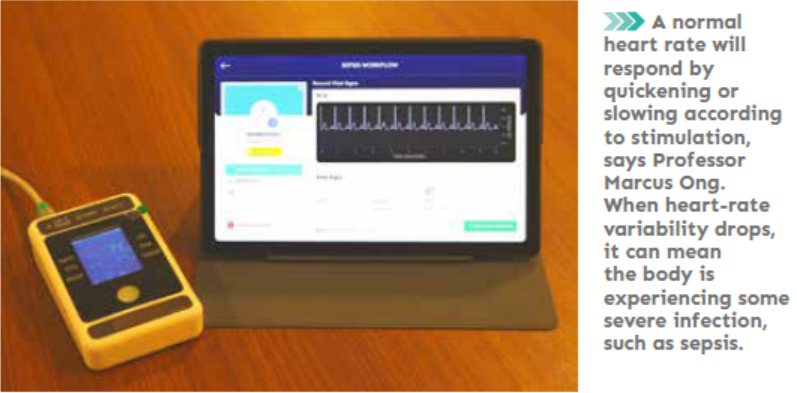A new technique using an electrocardiogram can predict the severity of deadly sepsis quickly and effectively, allowing for more timely treatment.
Some simple infections can rapidly turn into a life-threatening medical emergency known as sepsis. Its early symptoms are often not obvious; if not detected and treated quickly, the condition can quickly develop into severe sepsis and septic shock. The death rate can be as high as 50 per cent.
To determine the risk of sepsis-related death quickly and ensure timely treatment, researchers at Singapore General Hospital (SGH) and Duke-NUS Medical School have developed a technique to predict the severity of sepsis in five minutes.
“Our emergency department sees more than 1,000 patients a year who present with sepsis. In a busy environment, it helps to be able to quickly stratify them according to severity and mortality risk so that the department can efficiently redirect necessary resources and care to prevent patients with a higher risk from going into septic shock,” said Professor Marcus Ong, Senior Consultant, Department of Emergency Medicine (DEM), SGH, and the study’s senior author.
With the new technique, vulnerable patients like the elderly and the young, who may not be able to easily describe their symptoms, can be treated more quickly and monitored more closely, while those at lower risk can avoid unnecessary hospital admission, care and treatment, added Prof Ong.
Currently, a blood test is used to accurately assess a sepsis patient’s risk of dying. However, the test results can take two to four hours, which delays treatment. The team looked at expanding the use of a test known as heart rate variability (HRV) for its quick results.
“Traditional Chinese medicine has known for thousands of years that the pattern of the pulse contains important medical information. Heart rate should accelerate or decelerate according to stimulation. If there is a loss in HRV, it means that there is some severe disease in the autonomic nervous system,” said Prof Ong, who is also Director, Health Services and Systems Research (Signature Research Programme), Duke-NUS Medical School.
 The team’s Heart Rate n Variability (HRnV) model uses an electrocardiogram (ECG), with three electrodes attached to the patient’s chest to record his heartbeat. The time interval between heartbeats is analysed using an algorithm. Other variables include age, respiratory rate, blood oxygen levels, and other vital signs. The artificial intelligence (AI)-based tool is able to predict the severity of sepsis with an accuracy of more than 90 per cent, outperforming other established sepsis risk-scoring models.
The team’s Heart Rate n Variability (HRnV) model uses an electrocardiogram (ECG), with three electrodes attached to the patient’s chest to record his heartbeat. The time interval between heartbeats is analysed using an algorithm. Other variables include age, respiratory rate, blood oxygen levels, and other vital signs. The artificial intelligence (AI)-based tool is able to predict the severity of sepsis with an accuracy of more than 90 per cent, outperforming other established sepsis risk-scoring models.
HRV analysis is a useful tool for assessing sepsis patients’ mortality risk, but the amount of information that can be extracted is limited, said Associate Professor Liu Nan, the study’s corresponding author.
“HRnV, on the other hand, provides us with additional information to improve prediction. With the availability of more biomarkers derived from HRnV analysis, advanced AI approaches can be used for accurate and reliable patient risk assessment,” said Prof Liu, a data scientist from Duke-NUS’s Centre for Quantitative Medicine and Programme in Health Services and Systems Research.
During the course of their research, he said they found that “HRV may change even before other symptoms appear”.
The HRnV model used the data of 342 sepsis patients who were seen at SGH’s DEM between September 2014 and April 2017. To further validate its effectiveness, the team is conducting a larger study involving 1,000 patients at SGH and the National University Hospital. Another study involves infants at KK Women’s and Children’s Hospital. The team also wants to determine whether the technology can be developed into bedside devices for other uses in the DEM, clinics and even in homes for monitoring purposes.
Every year, sepsis kills more than five million people worldwide. In Singapore, close to 5,000 deaths were attributed to sepsis from pneumonia and urinary tract infection in 2019.
Get the latest updates about Singapore Health in your mailbox! Click here to subscribe.
Tags:
;
;
;
;
News Article;
;
Singapore General Hospital;
Article;
Singapore Health;
;
;
;
;
Singapore Health
